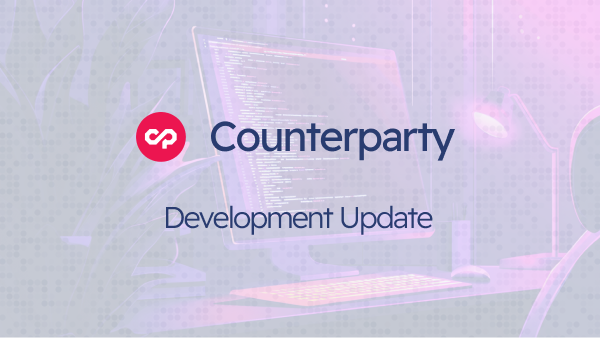It’s been awhile since we published our last community update, and it’s time we bring you up to speed with everything that was going on in the community for the past month.
From the Team
Over the last year and a half, Counterparty has evolved into the most advanced platform for creating financial instruments on top of Bitcoin, used by an increasing number of innovative projects. During the last couple of months, our goal was to wrap up the large scale improvements to the Counterparty software suite, complete comprehensive security audits, and once the protocol reaches a mature state start focusing on and building tools and services around it. Symbiont is a step in that direction, developing products that will be utilizing this technology, and we’re very excited to see it be put into use in systems that power modern finance.
From the Community
While our core team continues to work on making Counterparty the most advanced platform for smart contracts, our growing community continues to build useful tools for it. Here’s a list of various Counterparty open-source products, which was recently published on BitcoinTalk..
- Counterparty Tokens Availability Checker (via wordlist.txt)
- Online tools developed to work with Counterparty transactions. Create, sign, and broadcast multisignature transactions with Counterparty Assets or bitcoins. Operates with Mainnet and Testnet.
- Walletgenie : A modular CLI frontend to bitcoin, counterparty and digitial currency daemons
- A ruby gem for communicating with a Counterparty (Bitcoin / XCP) API server
- Javascript Library for Counterparty
- Gateway/vending machine prototype script for the Counterparty protocol
- A Counterparty and Bitcoin based auction machine
- A client library for the counterparty API
- A Counterparty Transaction Parser component for Tokenly
- A Counterparty transaction sender
- Counterparty Transaction Watcher
Another example of community contribution is the Counterparty mobile wallet developed by IndieSqare which was recently updated to v 0.5.2 on iOS and Android. The Indie team open sourced the client side source code, which can be found at https://github.com/IndieSquare/counterwallet. If you’d like to learn more about the wallet and its development, be sure to check out last week’s XCP update episode with our community director Robert Ross on Let’s Talk Bitcoin.
Our forum continues to be the central place for the community to discuss all things Counterparty. One particular thread that is worth mentioning in this update is the discussion on the transaction processing costs and ideas on lowering the frequency of payouts. You can read the comments or contribute to the discussion at https://counterpartytalk.org/t/req-send-to-many-in-a-single-tx/249/5
Finally, there was a question on the Skype chit-chat channel on how to destroy Counterparty assets and whether the Counterparty burn address can be used for that purpose. In order to prevent accidental destruction of coins, the Counterparty burn address does not support that and is not a valid destination. However, our forum thread has a list of valid burn addresses and a solution on how you can generate your own. The post is available here.
Development Updates
Last week we published an important announcement on the Counterparty forum regarding recent Bitcoin spam transactions. Here’s the summary of the issue and the current solution:
With the recent Bitcoin spam transaction volume, the modified version of bitcoind that counterparty uses (bitcoind-addrindex) will periodically experience responsiveness issues.
The cause of this appears to be a the large mempool size, and we have seen bitcoind-addrindex become unresponsive starting with mempool sizes anywhere from 3,000 to 10,000 entries.
At the moment, the best method to mitigate this problem seems to be adding the following parameters to one’s bitcoin.conf, which will cause your node to ignore most of these spam transactions:
minrelaytxfee=0.00005
limitfreerelay=0
This will greatly slow the growth rate of the mempool, and reduce its size, but does not seem to eliminate the problem at the moment.
The Counterparty team is working on a more robust solution and we’ll keep you updated on the progress.
In other development news, Bitcoin Core v0.11.0 was released, followed by btcdrak’s v0.11.0 addrindex patch (used by Counterparty). Major changes in the new version include:
- Protection from transaction flooding is easier
- Block file pruning
- Big endian support
- Memory usage optimization
- Fee estimation changes
- Privacy: Disable wallet transaction broadcast
- Privacy: Stream isolation for Tor
That concludes our update for this week. If you have any questions you can contact us via our gitter, forum or github.
